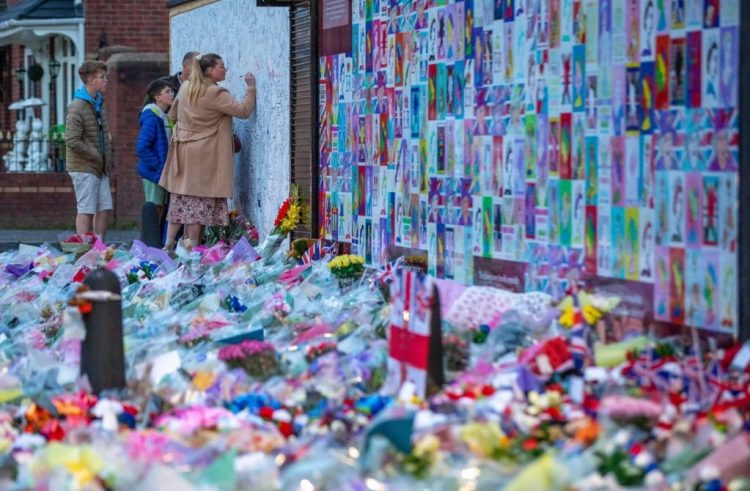Queen Elizabeth II’s death raised many discussions about the British monarchy’s popularity in other countries while reviving anti-imperial feelings. Different groups in Ireland have reminded everyone about their painful history under the British Empire. Although fans of the Royal family felt sorrow for the Queen’s death, many Irish celebrated the end of the British monarch.
Irish People Feel No Sympathy for the Queen
Queen Elizabeth II died at age 96 after 70 years of reigning. Her death was met differently around the UK and the World. The end of Queen Elizabeth II raised questions about the British monarchy’s relationship with its former colonies. In many countries, the connections are complicated and diverse. England conquered Ireland militarily and politically for more than eight centuries until the early 20th century. Politicians in Ireland sent their condolences for the Queen’s death, but many Irish citizens have not reacted the same.
People Remember Difficulties During the Queen’s Reign
Queen Elizabeth II became the UK’s longest reigning monarch in 2015. In 2022, she became the first monarch in the UK’s history who celebrate a Platinum Jubilee. Queen Elizabeth II was the monarch of the United Kingdom’s four nations and the Commonwealth realms. People in these regions have paid tribute to the Queen, but numerous people were not sorrowful about her death. Irish have not been sad about Queen Elizabeth II’s death due to their country’s brutal past.
Many Irish Do Not Admire British Royals
In Ireland, there are complex reactions and feelings about Queen Elizabeth II. While some were grieving for her, videos of Irish people celebrating the Queen’s death went viral. The Irish people’s response to the end of Queen Elizabeth II demonstrates resentment toward the British ruling family. Ireland was not like the other colonies of the British Empire. However, it was the first country that England invaded. Ireland remained an integral part of the English Empire until the foundation of a modern state in 1921.
British Ruling in Ireland Was Violent
The Queen was old, and everyone expected her passing, but some Irish expressed pleasure over her death, disrespecting Queen Elizabeth. After her death, a group of football fans in a Dublin stadium chanted ‘Lizzy’s in a box’. The Irish people have diverse emotions about the old British Empire. Their country was under British control during a painful historical violent conflict. During the modern era in the 1990s, Irish people again witnessed violence between the fans of the Queen and the nationalists.
Irish Won’s Forget Pains of British Empire
Among many troubles in relations between Ireland and Britain, the Potato Famine of the 19th century was a turning point. At that time, a million Irish people died because of hunger, and more than two million Irish had to escape. Queen Elizabeth II was not the monarch then, but the English Empire she inherited did nothing to save the people in the 1870s. Queen Elizabeth II later expressed sympathy over the troubled past, but the sadness remains in some people of Ireland.
British Empire Ends after Queen
After the Queen’s death, her coffin toured around the country. At the same time, some Irish people made a coffin marked as RIP British Empire and threw it into Dublin’s River. The anti-imperialist people marched in Dublin carrying the coffin to demonstrate their anti-colonial feelings. The protest objected to the flying half-mastered of the Irish flag for the Queen’s death. The traditional British monarchy will most probably change after Queen Elizabeth II. However, the protesters in Ireland have opposed the normalisation of relations with Britain.
Irish People Want an Abolished Monarchy
Many Irish people had no interest in the British monarchy and suggested its abolition. The anti-British Irish have meant real democracy for the people of Britain. Irish anti-monarchy protests have said they did not want their politicians to lean toward the British royals. They have said the British monarchy symbolised oppression and exploitation, and people must have abolished it long ago. Furthermore, the group criticised the funeral of a foreign tyrant whose Royal family brought nothing but misery to Ireland.
Queen Inherited Her Ancestors’ Colonial Past
While Elizabeth ruled a post-colonial Britain, she has borne a connection to her ancestors’ colonial past. The royal family under Elizabeth kept celebrating coronation and Jubilees while such traditions are outdated around the World. The joy over Queen Elizabeth’s death among some people was mostly because she reigned a monarchy that was violent. The British Empire was an oppressor which ruled many countries around the World. As the Empire diminished, it reserved its ties to the past and kept the monarchy of the Commonwealth realms.
Queen Lived as a Successor to British Royal
The British monarchy has a centuries-old history of slavery in many of its former colonies. Many people suffered slavery and neo-colonialism during the British monarchy’s rule in Ireland. Today, colonialism and oppression maintain their effects, and former British colonies have suffered colonialism because of the British monarchy. The anti-colonial movements have already asked the Queen for an apology because of the British monarchy’s slavery tradition. She has never publicly acknowledged or apologised, however.
Irish Union Highly Possible After Queen
The replacement of the British monarch could revive the unpleasant memories of the British monarchy in Irish Ireland. Since 1921 the island has been divided into the Republic of Ireland and Northern Ireland. The Queen’s loss could become a game changer and empower the Irish nationalists and republicans. A century after the foundation of the Republic of Ireland, nationalists in Northern Ireland earned a historic gain in the Assembly election. This landmark victory, Brexit, and the new monarch could change the status quo in Irish Ireland.
Irish People Have Spirit of Independence
Queen Elizabeth II’s death revived criticism of the British Empire’s historical oppression in other countries, including Ireland. Although Ireland became an integral part of Britain in the 12th century, it always fought to become independent from Britain. As the British Empire was diminishing, the Republic of Ireland, with the capital city of Dublin, gained independence from England in 1921. After two years of conflict between Irish republicans, Ulster loyalists, and British government forces, Ireland became independent.
Reunification of Ireland Is a Good Plan
The nationalist party Sinn Fein has talked about a referendum on the reunification of Ireland within five years. The party’s leader has said Irish unity is the best opportunity for all who live on the island. The anti-British monarchy groups want the reunion of all counties in both Ireland and Northern Ireland. Northern Ireland is made up of 6 counties, and the Republic of Ireland is made up of 26 counties. It is an excellent opportunity for them to reunify.
Division Between Ireland and Britain Is High
Queen Elizabeth II ascended the throne of a colonial monarchy unpopular in Ireland. Many people have condemned Britain’s savagery in Irish Ireland and disrespected the Queen’s funeral. Global sympathies and tribunes after the death of the Queen have not erased the pains of cruel British rulers in Ireland. Such disrespect and anger toward the late British monarch demonstrate the deep division between the Irish public and the British central ruling system. Therefore, the new British monarch must make himself ready for historic changes.





























